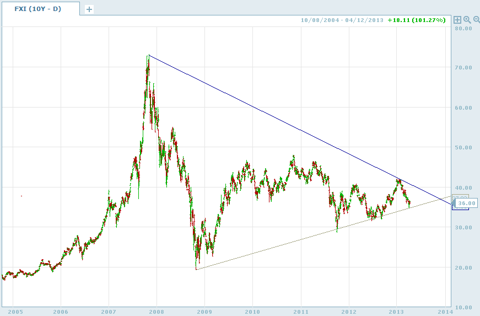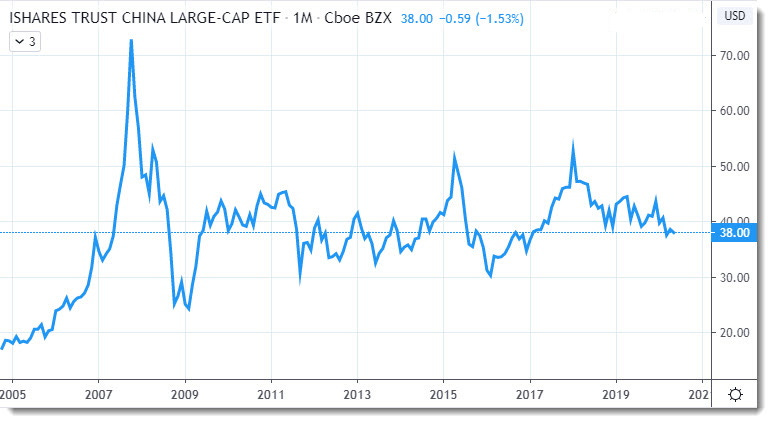This article was originally published seven years ago on SeekingAlpha, and is presented here as a reminder that China's troubles have been in motion well before the coronavirus captured the headlines and everyone's attention. As it stands, Western Civilization has been urged to reverse the outsourcing movement of the last century, as indicated in "China And The Coronavirus Message."
Although it may appear misplaced, China's stance on North Korea, a state that has been traditionally under Chinese protection come hell or high water, speaks volumes about China's domestic affairs, especially the weakening economy.
One nuclear test, a long-range rocket launch and much saber-rattling later and China is a central player in new U.N. sanctions against Pyongyang, something Chinese experts say marks a major shift in Beijing's policy toward its impoverished neighbor.
Although not much is said about it, politics are no longer the driver, but rather economics, and the heavy dependence on exports to developed markets has forced China to revisit its relationship with its much cherished neighbor. The risk is that the young and untested Kim Jong-un could come "un-hinged" just to see what happens when he pushes the red button, and then western markets will hold China accountable for North Korea's actions. All Washington has to do is to communicate privately to China that crippling trade sanctions - the magnitude of a nuclear explosion - will be imposed if China fails to control North Korea, and the latest news feeds into the logic, as unusual as the agreement is.
The U.S. and China agreed to work together toward persuading North Korea to abandon its nuclear pursuits in a move that highlighted China's growing frustration with a long-standing yet volatile Communist ally.
Housing always captures the headlines - it's up, it's down, but never just right - but some facts provide the eye opener that investors need. Wang Shi, the chairman and founder of China Vanke, the biggest property-development firm in China, pointed out recently that the "average resident trying to buy an apartment in Shanghai would have to pay more than 45 times his or her annual salary." It does not take a genius to realize that an individual or a family earning the Shanghai average salary of about $9,000 per year cannot afford a $400,000 apartment, and even if these apartments are owned by wealthy investors, where's the broad rental market? If an investor seeks a capitalization rate of 8%, then rent must be at least $2,600 per month. Will they hold them unoccupied indefinitely, while the apartments rot away?
Then there's the commercial real estate market, another albatross that is often missed in conversation, and is yet another indicator of overcapacity that must be dealt with.
Wang Yongping, secretary general of the China Commercial Real Estate Association, cited as examples Shenyang, Chengdu and Tianjin. "The supply is huge in these cities, but it is difficult for developers to find enough retailers and other businesses to lease to in the short term," he said.
But real estate is now an addiction that is crucial to keeping the party going, because when many Chinese lose their life savings, the social unrest will make Tiananmen Square look like a neighborhood BBQ - and the Politburo knows it. Although controlling housing speculation is an aberration on the surface and viewed as a political failure, especially because "the government has complete control over tax and lending policies," the dependency is obvious because government gets a lot of money from the practice and land sales. The property tax proposal has also met resistance because "more than 90 percent of government officials" own several homes. It's a catch-22 situation without a good solution. And while the government talks about controlling runaway speculation, land sales for residential construction during Q1 of this year already amounts to 85% of all land sales for 2012. Way to go!
In a general sense, overcapacity is a condition that must be dealt with, and unless the issue is addressed "in traditional manufacturing and emerging industries in the coming years," as outlined by authorities, "bankruptcy, debt and unemployment may cause a financial crisis." A finer example of overcapacity can be found in the garment industry, where export dependency is a heavy burden because "the industry overall has unsold inventory worth 38.2 billion yuan (US$6 billion), which accounts for three years of total sales revenue." The side effects of a weaker economy have been documented, and the article "As Economy Slows, Firms Leave Bills Unpaid," highlights the issues. Then there's always the story about infrastructure being built and never used, an economic model that keeps people employed in the short-term and always delivers tremendous shockwaves down the road. Growth at any cost always has its costs.
In the Chinese city of Nanchang, where the local government is building a new subway network, the modern train station rising out of the red earth sits in an empty part of town. The crowds that Nanchang envisions will someday use its metro are nowhere in sight.
The banking system is also deeply invested in the political charade, and "China's banks are feeding unwanted assets into the country's 'shadow banking system' on an unprecedented scale, reinforcing suspicions that bank balance sheets reflect only a fraction of the actual credit risk lurking in the financial system," as reported by Reuters.
Considering that the IMF is an institution whose mission is to fire early warnings, but is a failure and is always behind the curve, one must consider seriously the organization's statement that "China's economy relies on an excessively high level of investment and risks a potentially destabilizing increase if the government aims to keep growth around current levels for years to come." There's a strong desire at the political top to prop perceptions, and it will not end well.
But still many view China as the miracle of the century, although economic data is as reliable as a flat tire. As a quick example, "The country's jobless figure has been mysteriously static since 2010, meaning a government statistic that should be reliable simply isn't." Yet, Jim O'Neill, the father of BRIC, explained the Chinese economic slowdown as follows:
Indeed, a key reason for China's slowdown in 2011-2012 is that officials wanted it. While the real GDP growth rate stated in the 12th Five-Year Plan should not be viewed as a fait accompli, the fact that the Plan's growth rate was lowered to 7% is a powerful signal of official intent.
But if that is the case, why do they keep investing in infrastructure at breakneck speed? Or, unlike any other government in the world, do they have a magic wand that produces results exactly as targeted? If one reads the article, it becomes quite apparent that Mr. O'Neill doesn't understand the political and social factors that are in play, or simply chooses to ignore them. Zhiwei Zhang and Wendy Chen, economists at Nomura, delivered a sobering assessment of the situation.
"China faces rising risks of a systemic financial crisis and the government needs to take action quickly to contain such risks. We believe the true extent of financial risks in China is not fully appreciated by investors."
In addition the recent increase in loans does not indicate that "officials want a slow down," with new loans exceeding 1 trillion yuan in March, and a remarkable increase from the February total of 620 billion yuan. Fitch's downgrade of China's local currency credit to A+ from AA- will not precipitate an immediate exodus by investors, but the reasoning is in line with common sense.
"Underlying structural weaknesses" in the Chinese economy, including low average incomes, lagging standards of governance, and a rapid expansion of credit. The agency also warned of the growing risks from the rise of shadow banking, and said that total credit in China may have reached 198 percent of gross domestic product by the end of last year, up from 125 percent in 2008.
The frustration is in knowing what exactly is going on behind the curtain, considering that "Chinese Officials Are Even More Pessimistic on Local Debt Than Fitch," with "recently estimated current local debt outstanding at 15 to 18 trillion yuan," and exceeding "Fitch's estimate of 12.85 trillion yuan." What was conspicuously missing was the typical official outrage regarding the downgrade, while official economic data is starting to raise bigger red flags.
Though the economy has shown signs of a gentle recovery since late last year, Wednesday's robust trade data came as a surprise to market watchers, who delved further into the breakdowns and found an unusual surge in the mainland's exports to Hong Kong in March, which were reportedly up 93% year on year.
The shift to domestic consumption from export dependency is also underway, or so we're told, but the retail sales trend is anything but inspiring if domestic demand is to gradually fill in the gap.
While GDP is still going strong despite the recent decline to 7.7% from 7.9%, current premier Li Keqiang pointed out in 2007, and well before the global crisis truly flourished, that "China's GDP figures are 'man-made' and therefore unreliable."
What to do about the increasing and inevitable loss of political power? As pointed out by The Telegraph on November 2012, "President Hu Jintao opened the 10-year power handover with a clear warning to modernizers that Beijing will not give up control over the commanding heights of industry and commerce." The hard core elite is still in charge, and while state capitalism served its purpose, all was well. Now the game is changing, and the point was made that "the hardliners seem poised to snatch control of the seven-man Committee, tying the hands of incoming president Xi Xinping and premier Li Keqiang."
Censorship is on the rise, and the Internet is a prime target. Yet, it's only an example of how the government needs to quell dissension, as "Policymakers Float Tighter Internet Regulations," while "the proposed measures would officially sanction monitoring of Internet activity and coordination with Internet-related companies."
The claims of yesteryear regarding China's ascension in the world stage will subside, the spotlight will dim, and the new found fame will vanish, Milli Vanilli style. China is akin to a train about to enter a dead-end dark tunnel and only the locomotive engineer knows it, and won't tell the passengers to avoid a mutiny.
From an investment perspective, the short-term is always tradable as news flow and daily perceptions change, but the long-term is an entirely different story, and despite a remarkable market rally in the U.S.A., China is stuck much closer to the bottom than an emerging power should be, especially when government "stimulus" and easy money is not unique to America. Lastly, considering that in this global village everyone is interconnected, let's not forget that China owns 31% of U.S. debt held by foreign entities (Japan is top holder with 35%), and less than 10% of total U.S. debt, demystifying the political danger that often makes the rounds. Yet, China will have to cash some chips to feed the locals, and the fallout will have to be addressed by the U.S. government in due time.
P.S.: iShares Trust China Large-Cap ETF (symbol: FXI) is virtually unchanged since 2013, hardly a sign of a superpower in the making.







